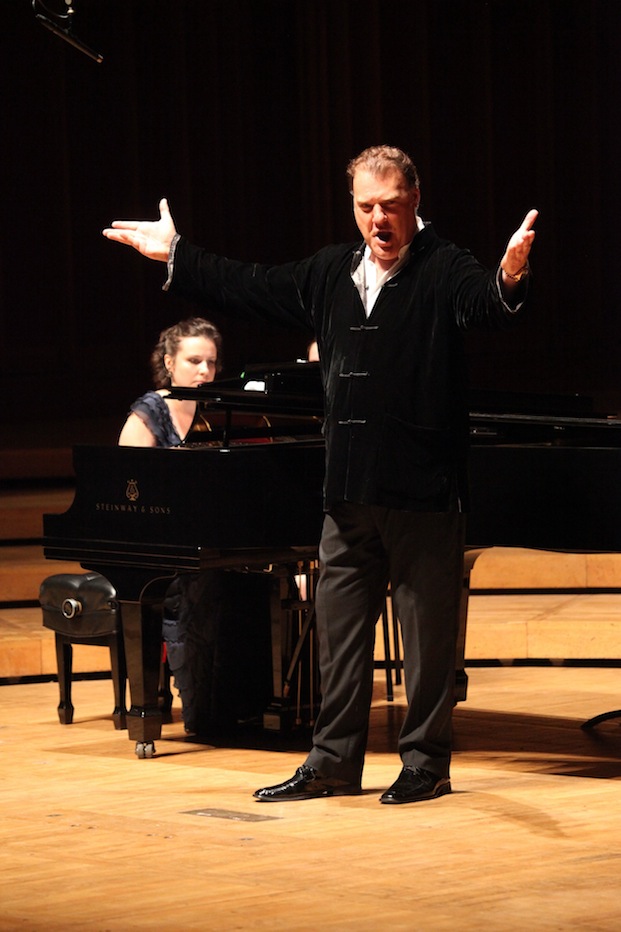Terfel sings characterfully of land and sea at Tanglewood

Bryn Terfel performs in recital with pianist Natalia Katyukova Thursday night at Tanglewood’s Ozawa Hall. Photo: Hilary Scott
Bryn Terfel, with his nimble, earthy vocal tone and towering build, strikes a commanding figure on the operatic stage. But in his program of German and English songs Thursday night at Tanglewood’s Ozawa Hall, the Welsh bass-baritone also proved as versatile an actor and storyteller in more bite-sized works. In each, he mined the music for dramatic essence, maneuvering between grand, stoic, and even comical presences with flair.
He set the tone for the evening with a trilogy of John Ireland songs, each one a setting of John Masefield’s poetry. The soft, impressionistic hues of Sea Fever, Vagabond, and The Bells of San Marie—chestnuts in Terfel’s concert repertoire—were charming in their modal-inflected sonorities and free-flowing rhythm. At the piano, Natalia Katyukova answered with a delicate and sensitively played accompaniment, a distinguishing feature she carried throughout the program.
Masefield’s lyrics also gave plenty of room for the singer to explore the humorous side of the rum-loving sailor in Peter Warlock’s Captain Stratton’s Fancy. Terfel gestured freely with his hands, cast his gaze around the hall to connect with listeners, and even punctuated Warlock’s drinking song with a hiccup. Terfel and Katyukova kept to a slow tempo to make room for expressive freedom and, perhaps, for the pianist to negotiate the bustling piano part. This otherwise spirited and humorous performance came off a little cautious as a result.
Sedate tempos, though, well suited the rendering of Frederick Keel’s “Three Salt Water Ballads.” Terfel’s saccharine tone and colorful diction (abundant rolled R’s and percussive T’s) for the first of these, Port of Many Ships, an evocative ballad in the style of Ireland’s Sea Fever, captured the Edwardian nostalgia for the sea. Terfel lightened the mood in Trade Winds, squeezing his vocal tone to portray the squeaking fiddles referenced in the verse. The tongue-twisting ballad Mother Carey, also featured the baritone in fine dramatic form as he sang of the horrors of the legendary sea witch.
A setting of Roger Quilter songs had direct appeal. Terfel, with full control of his silvery upper range in soft volume, gave the lines of Weep You No More, Sad Fountains an achingly beautiful touch. His elegant sound and restraint brought shape to the melodies of Go, Lovely Rose and Fair House of Joy as well.
For the second half, Terfel turned to German song. Robert Schumann’s Widmung and Du bist eine Blume provided more opportunity for the singer to show off the sweeter side of his upper register. Schumann’s evocative piano writing also enabled Katyukova to explore a wider range of the keyboard, especially when portraying the bumpy slow-moving cart in Mein Wagen rollet langsam. Here as well, Terfel made the character in Heinrich Heine’s poem his own, laying back on the tempo and lightening his tone as the cart driver slips into a daydream.
The most dramatic of the Schumann set, Die Beiden Grenadiere, mocks French patriotism at the end of the Napoleonic wars. Through Terfel’s speech-like delivery of Heine’s verse, two soldiers lament the fall of Napoleon. His full-throated intoning of La Marseillaise quotation and soft-toned conclusion transformed the song’s theme from derision into tragedy.
Returning to themes of seafaring and nostalgia, Terfel offered Schubert’s Auf den Wasser zu singen and, aided by Katyukova’s cascading piano figures, kept the music moving in gentle ebb and flow. Singer and pianist opened the throttle for a character-filled Die Forelle. Schubert’s prayerful Litanei featured Terfel at his most subdued and haunting. He sang each verse softer than the previous one; by the final line, his singing sounded barely above a whisper.
To close, Terfel returned to music of the British isles, performing a heartfelt collection of the traditional songs Danny Boy, Passing By, the Welsh anthem Ar hyd y nôs (All through the night), and Loch Lomond. For the final one, Terfel invited everyone to sing along to the chorus.
He wasn’t convinced by the effort. “Come on! They did it better in New York,” he joked before making everyone sing it again.
Enthusiastic applause brought Terfel back to the stage three times for encores. Humorous ballads The Green-eyed Dragon and The Big Brown Bear featured Terfel growling like the animals themselves. His closing number, Home on the Range, was a witty and touching tribute to another operatic and concert baritone, John Charles Thomas, who himself famously offered the song as an encore after a performance of Aïda.
Bryn Terfel, mezzo-soprano Katarina Dalayman and soprano Amber Wagner will perform Act 3 of Wagner’s Die Walküre, 8:30 p.m. Saturday at the Koussevitsky Shed. bso.org
Posted in Performances





Posted Jul 25, 2013 at 6:27 pm by Tom Kennedy
Thanks for the picture and review of Bryn Terful’s performance. Its was wonderful. We would like to print it as a memento but can’t seem to do it. Any advise?
Tom Kennedy